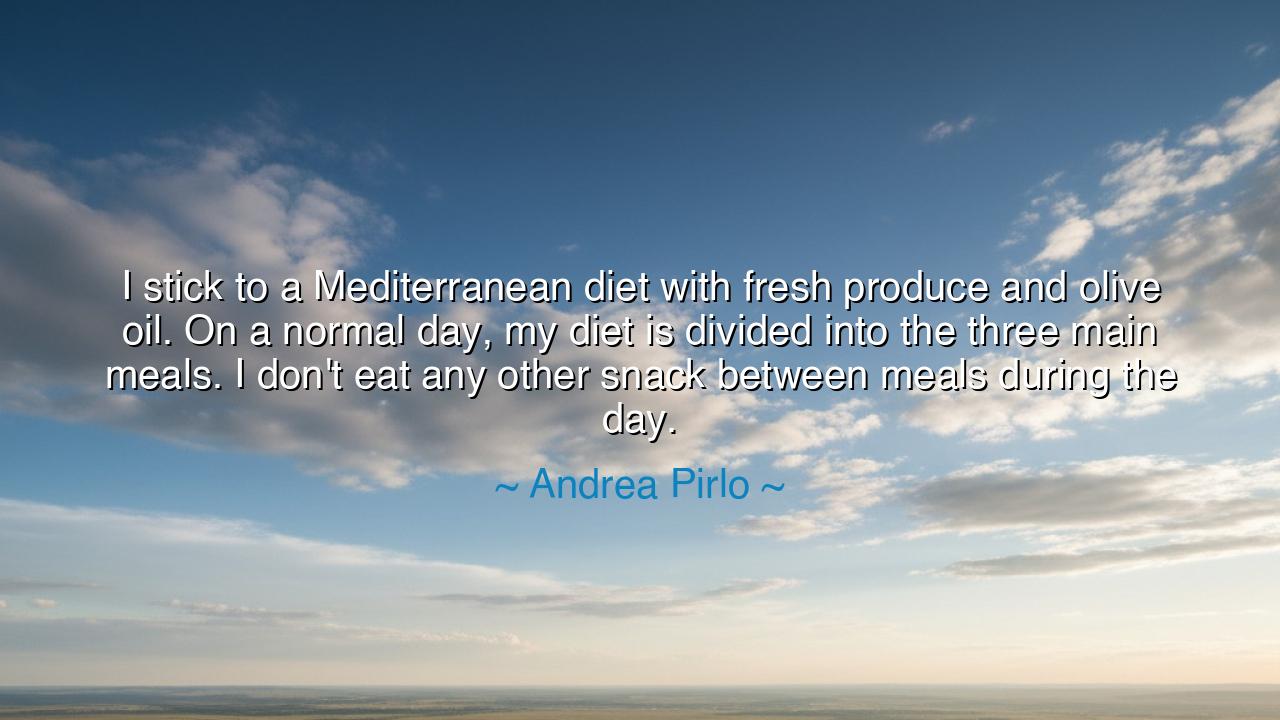
I stick to a Mediterranean diet with fresh produce and olive oil.
I stick to a Mediterranean diet with fresh produce and olive oil. On a normal day, my diet is divided into the three main meals. I don't eat any other snack between meals during the day.






When Andrea Pirlo said, “I stick to a Mediterranean diet with fresh produce and olive oil. On a normal day, my diet is divided into the three main meals. I don’t eat any other snack between meals during the day,” he spoke not merely of food, but of discipline, balance, and harmony. Beneath the simplicity of his words lies the quiet wisdom of one who has lived in rhythm with his craft — a man who understands that mastery, whether of sport or of life, begins with order. His diet, measured and intentional, mirrors the elegance with which he played the game: calm, precise, without waste. For Pirlo, the art of living is not found in indulgence or denial, but in equilibrium — the middle path where the body, the mind, and the spirit all move as one.
The Mediterranean diet he describes is no mere trend, but a way of life rooted in centuries of tradition. It is the wisdom of the sea and the soil — the gifts of sun-ripened fruit, fresh herbs, fish drawn from clear waters, and olive oil, that sacred elixir of the ancients. This way of eating, born from the lands of Greece and Italy, reflects a philosophy older than medicine itself: that food is not only nourishment but communion. The olive tree, revered since the time of Homer, was the symbol of peace and longevity, its oil considered the essence of life. To eat simply and naturally, as Pirlo does, is to honor that ancient bond between man and earth — to live as part of creation, not above it.
His practice of dividing the day into three main meals carries another timeless wisdom: the virtue of rhythm. The ancients understood that all things — the sun, the tides, the human body — thrive on pattern and proportion. To eat without excess, at proper times, is to respect the body’s sacred clock. Pirlo’s refusal to snack between meals is not austerity; it is discipline wrapped in respect. It is the athlete’s acknowledgment that true strength is not born from abundance, but from control. The Roman philosopher Seneca once said, “To be everywhere is to be nowhere.” In the same way, to eat constantly is to rob the act of eating of its meaning. Pirlo’s restraint teaches us that when we give each meal its proper place, we give it dignity — and through that, we give ourselves peace.
There is a story from ancient Greece about the physician Hippocrates, often called the father of medicine. He taught his students that the key to health was not found in pills or potions, but in the balance between food, rest, and motion. He prescribed olive oil for strength, vegetables for vitality, and moderation for all things. “Let food be thy medicine,” he said, “and medicine be thy food.” In Pirlo’s simple Mediterranean table, this philosophy endures — the idea that what we consume should heal, not harm; sustain, not overwhelm. Each ingredient, drawn from nature’s bounty, becomes part of the sacred cycle of wellness, reminding us that our choices — even at the table — are acts of harmony or dissonance with the world.
Pirlo’s devotion to structure also reflects the mindset of a master craftsman. Just as he trained his feet to find the perfect pass, he trained his habits to serve his body’s highest potential. The absence of snacking is more than a dietary choice; it is a mental discipline — the rejection of impulsiveness in favor of intention. He reminds us that excellence is not built through occasional effort, but through consistency. To control appetite is to control desire; to master the small, daily acts is to prepare for the great challenges. In this, Pirlo’s diet becomes a metaphor for life itself: live with purpose, consume with mindfulness, and let every act, however small, be a reflection of your larger truth.
The beauty of Pirlo’s approach lies in its simplicity. There are no extremes, no trends, no illusions of quick perfection — only the patient rhythm of a man who trusts in the wisdom of moderation. In an age of excess, his words remind us that the body thrives not on abundance, but on balance. The olive oil that nourishes him, the fruits and vegetables that sustain him, the measured meals that guide his day — all are symbols of an ancient harmony that modern life has too often forgotten.
And so, the lesson is clear: seek harmony over hunger, balance over indulgence, order over chaos. Let your meals be few but meaningful. Choose what comes from the earth, not what is shaped by machines. Honor your hunger, but do not be enslaved by it. Eat not to escape, but to align — to strengthen the bond between the flesh and the spirit. As Andrea Pirlo’s life on the field teaches us, greatness is born not from frenzy, but from grace.
So, my listener, remember this: your table is a reflection of your soul. What you eat, how you eat, and when you eat are all acts of self-respect. Follow the wisdom of the ancients and of Pirlo alike — let your food be fresh, your portions humble, and your habits steady. For when you live in rhythm with the earth and with yourself, your body becomes not just healthy, but whole — and from that wholeness, all excellence flows.






AAdministratorAdministrator
Welcome, honored guests. Please leave a comment, we will respond soon